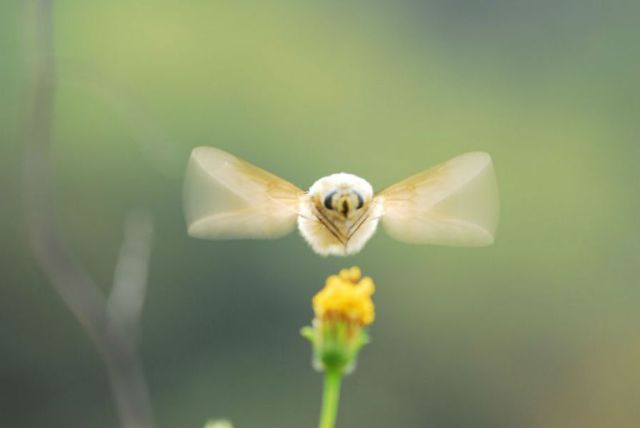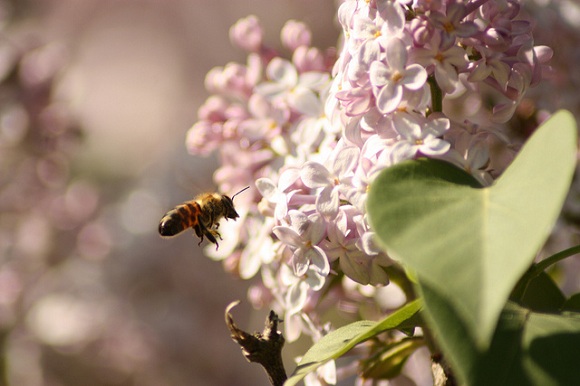bees
Now that it’s October, fall is slowly beginning to creep up on Japan, which means seasonal favorite dishes including pumpkin, sweet potato, and mushroom will again be arriving on dinner tables across the land in no time. As for the lattermost, people from the countryside are more likely to pick or grown their own rather than buy mushrooms from the supermarket, and some varieties like matsutake can easily retail for a few hundred dollars.
Unfortunately matsutake and other kinds of mushrooms don’t fetch quite as high of a price in China, but while one man was gathering mushrooms, he stumbled across something that was worth much more: a giant bees’ nest.
Yes, you read that right: A cute bug! Well, that is up to debate, but it is definitely not as a gross as other bugs, like that hand-sized spider I had in my house that one time…
Because of the way they hover and their fuzzy bodies, these cute little fellas kind of look like a cross between a hummingbird and a bee. Their long mouth/noses resemble those of a nasty mosquito, but the fact that they are barely 10mm long (approximately the length of the first part of your pinkie finger) and harmless pollinators make them really people-friendly. Join us after the jump as we meet arguably the world’s most affable insect: the Tiger Bee Fly.
Kyoto Sangyo University opened a brand-new research facility this week, the Honeybee Industry Research Center, to study the ecology of the little bumblers and the benefits of their honey. This kind of specialized facility is extremely rare and is generating a lot of buzz among entomologists. Read More





 Starbucks Japan releases first-ever Hinamatsuri Girls’ Day Frappuccino
Starbucks Japan releases first-ever Hinamatsuri Girls’ Day Frappuccino Japan’s craziest burger chain takes menchi katsu to new extreme levels
Japan’s craziest burger chain takes menchi katsu to new extreme levels Beautiful blue apple jam is taking the Japanese internet’s breath away!
Beautiful blue apple jam is taking the Japanese internet’s breath away! We spend Culture Day in prison, food was arguably better than Yoshinoya
We spend Culture Day in prison, food was arguably better than Yoshinoya Here’s what happens when you mix all 53 kinds of Muji curry into one crazy super curry【Taste test】
Here’s what happens when you mix all 53 kinds of Muji curry into one crazy super curry【Taste test】 Häagen-Dazs Japan’s delicious mochi ice cream makes a comeback this fall
Häagen-Dazs Japan’s delicious mochi ice cream makes a comeback this fall Yakuzen ramen restaurant in Tokyo is very different to a yakuza ramen restaurant
Yakuzen ramen restaurant in Tokyo is very different to a yakuza ramen restaurant 566 million yen in gold bars donated to Japanese city’s water bureau
566 million yen in gold bars donated to Japanese city’s water bureau Hey, 2020s kids! The ’90s have a sticker picture message waiting for you in Tokyo
Hey, 2020s kids! The ’90s have a sticker picture message waiting for you in Tokyo Tokyo Skytree turns pink for the cherry blossom season
Tokyo Skytree turns pink for the cherry blossom season Highest Starbucks in Japan set to open this spring in the Tokyo sky
Highest Starbucks in Japan set to open this spring in the Tokyo sky Japanese restaurant chain serves Dragon Ball donuts and Senzu Beans this spring
Japanese restaurant chain serves Dragon Ball donuts and Senzu Beans this spring Japan Extreme Budget Travel! A trip from Tokyo to Izumo for just 30,000 yen [Part 1]
Japan Extreme Budget Travel! A trip from Tokyo to Izumo for just 30,000 yen [Part 1] Japan has only one airport named after a samurai, so let’s check out Kochi Ryoma【Photos】
Japan has only one airport named after a samurai, so let’s check out Kochi Ryoma【Photos】 Japanese drugstore sells onigiri at pre-stupid era prices, but how do they compare to 7-Eleven?
Japanese drugstore sells onigiri at pre-stupid era prices, but how do they compare to 7-Eleven? Burning through cash just to throw things away tops list of headaches when moving house in Japan
Burning through cash just to throw things away tops list of headaches when moving house in Japan Starbucks Japan releases new sakura goods and drinkware for cherry blossom season 2026
Starbucks Japan releases new sakura goods and drinkware for cherry blossom season 2026 Japan’s newest Shinkansen has no seats…or passengers [Video]
Japan’s newest Shinkansen has no seats…or passengers [Video] Foreigners accounting for over 80 percent of off-course skiers needing rescue in Japan’s Hokkaido
Foreigners accounting for over 80 percent of off-course skiers needing rescue in Japan’s Hokkaido Super-salty pizza sends six kids to the hospital in Japan, linguistics blamed
Super-salty pizza sends six kids to the hospital in Japan, linguistics blamed Starbucks Japan unveils new sakura Frappuccino for cherry blossom season 2026
Starbucks Japan unveils new sakura Frappuccino for cherry blossom season 2026 Foreign tourists in Japan will get free Shinkansen tickets to promote regional tourism
Foreign tourists in Japan will get free Shinkansen tickets to promote regional tourism The 10 most annoying things foreign tourists do on Japanese trains, according to locals
The 10 most annoying things foreign tourists do on Japanese trains, according to locals Take a trip to Japan’s Dododo Land, the most irritating place on Earth
Take a trip to Japan’s Dododo Land, the most irritating place on Earth Naruto and Converse team up for new line of shinobi sneakers[Photos]
Naruto and Converse team up for new line of shinobi sneakers[Photos] Is China’s don’t-go-to-Japan warning affecting the lines at a popular Tokyo gyukatsu restaurant?
Is China’s don’t-go-to-Japan warning affecting the lines at a popular Tokyo gyukatsu restaurant? Survey asks foreign tourists what bothered them in Japan, more than half gave same answer
Survey asks foreign tourists what bothered them in Japan, more than half gave same answer Japan’s human washing machines will go on sale to general public, demos to be held in Tokyo
Japan’s human washing machines will go on sale to general public, demos to be held in Tokyo Starbucks Japan releases new drinkware and goods for Valentine’s Day
Starbucks Japan releases new drinkware and goods for Valentine’s Day We deeply regret going into this tunnel on our walk in the mountains of Japan
We deeply regret going into this tunnel on our walk in the mountains of Japan Studio Ghibli releases Kodama forest spirits from Princess Mononoke to light up your home
Studio Ghibli releases Kodama forest spirits from Princess Mononoke to light up your home Major Japanese hotel chain says reservations via overseas booking sites may not be valid
Major Japanese hotel chain says reservations via overseas booking sites may not be valid Put sesame oil in your coffee? Japanese maker says it’s the best way to start your day【Taste test】
Put sesame oil in your coffee? Japanese maker says it’s the best way to start your day【Taste test】 No more using real katana for tourism activities, Japan’s National Police Agency says
No more using real katana for tourism activities, Japan’s National Police Agency says Häagen-Dazs Japan’s delicious mochi ice cream makes a comeback this fall
Häagen-Dazs Japan’s delicious mochi ice cream makes a comeback this fall Yakuzen ramen restaurant in Tokyo is very different to a yakuza ramen restaurant
Yakuzen ramen restaurant in Tokyo is very different to a yakuza ramen restaurant 566 million yen in gold bars donated to Japanese city’s water bureau
566 million yen in gold bars donated to Japanese city’s water bureau Hey, 2020s kids! The ’90s have a sticker picture message waiting for you in Tokyo
Hey, 2020s kids! The ’90s have a sticker picture message waiting for you in Tokyo Tokyo Skytree turns pink for the cherry blossom season
Tokyo Skytree turns pink for the cherry blossom season We try Dom Dom Burger’s new limited-time-only Spicy Cod Roe Thick Egg Omelet Burger
We try Dom Dom Burger’s new limited-time-only Spicy Cod Roe Thick Egg Omelet Burger Starbucks Japan reveals new sakura drinkware collection, inspired by evening cherry blossoms
Starbucks Japan reveals new sakura drinkware collection, inspired by evening cherry blossoms Force cute anime boys to crossdress in new mobile simulation game
Force cute anime boys to crossdress in new mobile simulation game The fish in rural Fukui that rivals Japan’s most auspicious sea bream
The fish in rural Fukui that rivals Japan’s most auspicious sea bream Princesses, fruits, and blacksmiths: Study reveals the 30 most unusual family names in Japan
Princesses, fruits, and blacksmiths: Study reveals the 30 most unusual family names in Japan Stay home in style with Kyoto-easy hakama-inspired roomwear for men, women, and kids【Photos】
Stay home in style with Kyoto-easy hakama-inspired roomwear for men, women, and kids【Photos】 Japan’s Gaming Kotatsu Futon blanket is here to keep you warm, and gaming, all winter long
Japan’s Gaming Kotatsu Futon blanket is here to keep you warm, and gaming, all winter long Highest Starbucks in Japan set to open this spring in the Tokyo sky
Highest Starbucks in Japan set to open this spring in the Tokyo sky